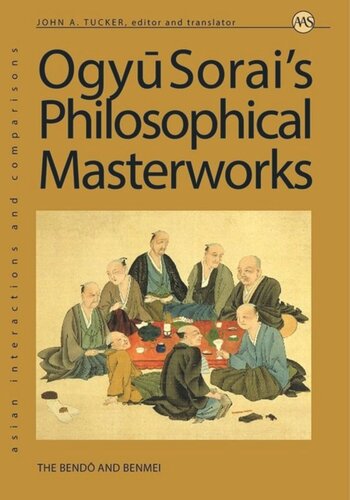

Most ebook files are in PDF format, so you can easily read them using various software such as Foxit Reader or directly on the Google Chrome browser.
Some ebook files are released by publishers in other formats such as .awz, .mobi, .epub, .fb2, etc. You may need to install specific software to read these formats on mobile/PC, such as Calibre.
Please read the tutorial at this link: https://ebookbell.com/faq
We offer FREE conversion to the popular formats you request; however, this may take some time. Therefore, right after payment, please email us, and we will try to provide the service as quickly as possible.
For some exceptional file formats or broken links (if any), please refrain from opening any disputes. Instead, email us first, and we will try to assist within a maximum of 6 hours.
EbookBell Team

4.8
84 reviewsOgyû Sorai (1666–1728) was one of the greatest philosophers of early modern Japan. This volume, a monumental work of scholarship, offers for the first time in any Western language unabridged and fully annotated translations of Sorai’s masterpieces. The Bendô (Distinguishing the Way) and Benmei (Distinguishing Names) are works of political philosophy that define the theoretical foundation for a leadership exercising total power, the best remedy, in Sorai’s view, for a regime in crisis. The translations are based on the 1740 (Genbun 5) woodblock edition, the first major edition of these seminal texts published during the Tokugawa period.
In his commentary, John Tucker situates the Bendô and Benmei in relation to Neo-Confucianism via what is known as "philosophical lexicography." This genre, which links Sorai’s thinking with Neo-Confucianism, is traced to the early-thirteenth-century Song dynasty text the Xingli ziyi (The Meanings of Neo-Confucian Terms) by Chen Beixi (1159–1223). Although Sorai was an unrelenting critic the Neo-Confucian formulations of the great Song synthesizer Zhu Xi (1130–1200), his thinking remained, due to its genre, methodology, and conceptual repertory, essentially a radical revision of Neo-Confucian discourse. Tucker’s introduction also examines the reception of Sorai’s two Ben during the remainder of the Tokugawa, calling attention to radical tendencies in later developments of Sorai’s thought as well as to the increasingly scathing critiques of his "Chinese" approach to philosophy, language, and politics. Finally, it traces the vicissitudes of the two Ben in modern Japanese intellectual history and their role in the formation of the ideas of Meiji intellectuals such as Nishi Amane (1829–1897) and Kato Hiroyuki (1836–1916).
As before, however, Sorai came under attack—this time for his supposed irreverence toward the throne, the Japanese people, and the imperial nation-state. Though an unpopular philosophy in early twentieth-century Japan, in the postwar years Sorai’s thought was interpreted (by Maruyama Masao and others) as an important modernizing force. While it critiques such ideologically grounded attempts to cast Sorai’s Bendô and Benmei as theoretical contributions to political modernization, Tucker’s study nevertheless acknowledges that Sorai’s masterworks, in their concern for language analysis as the way to solve philosophical problems, share significant common ground with the analytic approach to philosophy pioneered by various twentieth-century Anglo-American philosophers.